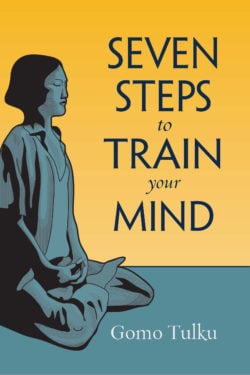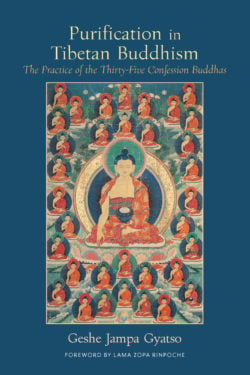Joan Nicell

Joan Nicell took her Buddhist vows of ordination with His Holiness the Dalai Lama in 1989. For nearly twenty years she has worked as an editor and translator of Tibetan books. She edited Purification Practice in Tibetan Buddhism by Geshe Jampa Gyatso, edited and translated Seven-Point Mind Training: An Introduction by Gomo Tulku, and has translated several important Tibetan works used in the Master’s Program of Buddhist Studies at Istituto Lama Tzong Khapa in Pomaia, Italy, where she lived and worked as educational program coordinator. She presently lives and teaches at Kopan Monastery in Nepal while also working as coordinator of the FPMT foundational level programs.
Books, Courses & Podcasts
Seven Steps to Train Your Mind
The aphorisms of the Seven-Point Mind Training present a powerful and counter-intuitive call to Buddhist practice—view reality as dreamlike, contemplate the kindness of your enemies, give up expectations of reward, change yourself but remain as you are! When he fled Tibet, Gomo Tulku carried in his heart this widely studied Tibetan text, which he turned to time and again when faced with difficulties in life. Having relied on this practice to transform his own hardships, he shares here an inspired commentary to help us get through ours. Mirroring the simplicity of the original, Seven Steps to Train Your Mind succinctly provides a practical description of how to train the mind and develop the mental qualities of peace, joy, and wisdom that will carry one through any circumstance.
This book was previous published as Becoming a Child of the Buddhas.
Read Chekawa Yeshe Dorje’s biography at the Treasury of Lives.
Purification in Tibetan Buddhism
In Purification in Tibetan Buddhism, Geshe Jampa Gyatso explains The Bodhisattva’s Confession of Downfalls, a daily practice for purifying negativities. This essential practice helps us to clear negative thoughts and actions from our body, speech, and mind.
In his delightfully conversational manner, Geshe Jampa teaches us the details of the law of cause and effect, the powerful use of the four opponent powers, and the proper manner and movements of prostrating, and provides clear descriptions of each of the thirty-five confession buddhas.
Formerly published as Everlasting Rain of Nectar.


